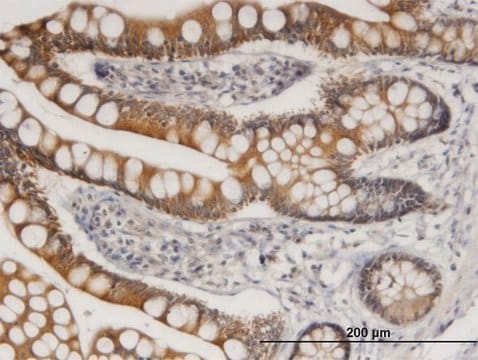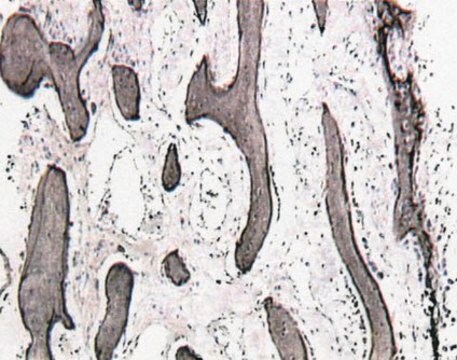추천 제품
생물학적 소스
mouse
Quality Level
항체 형태
purified immunoglobulin
항체 생산 유형
primary antibodies
클론
ID1.2, monoclonal
종 반응성
human
반응하면 안 됨
bovine, rat, pig
제조업체/상표
Chemicon®
기술
ELISA: suitable
immunocytochemistry: suitable
immunohistochemistry: suitable (paraffin)
radioimmunoassay: suitable
western blot: suitable
동형
IgG1
NCBI 수납 번호
UniProt 수납 번호
배송 상태
wet ice
타겟 번역 후 변형
unmodified
유전자 정보
human ... IBSP(3381)
pig ... Ibsp(397137)
rat ... Ibsp(24477)
일반 설명
Bone Sialoprotein II is one of the major noncollagenous proteins in the extracellular matrix of bone. It is a phosphorylated glycoprotein with an approximate molecular weight of 70 kDa. The protein has been found in osteoblasts and osteocytes. Diseases concerning bone turnover, pathological bone alterations, as well as the rapid increase of osteoporosis make it necessary to establish new markers. Bone Sialoprotein is discussed as a potential serum marker for monitoring bone remodeling.
특이성
Recombinant and native human bone sialoprotein II (BSPII). Does not react with osteopontin (BSPI) or osteonectin.
면역원
Bone Sialoprotein isolated from human bones.
Epitope: C-terminus
애플리케이션
Research Category
Cell Structure
Cell Structure
Research Sub Category
Osteobiology
Osteobiology
This Anti-Bone Sialoprotein II Antibody, C-terminus, clone ID1.2 is validated for use in ELISA, RIA, WB, IC, IH(P) for the detection of Bone Sialoprotein II.
Western blot: (1μg/mL)
Immunohistochemistry on paraffin embedded tissue sections: (1μg/mL)
Immunocytochemistry: (1:100)
ELISA: (1μg/mL)
RIA
Optimal working dilutions must be determined by the end user.
Immunohistochemistry on paraffin embedded tissue sections: (1μg/mL)
Immunocytochemistry: (1:100)
ELISA: (1μg/mL)
RIA
Optimal working dilutions must be determined by the end user.
결합
Replaces: AB1855
물리적 형태
Format: Purified
Purified immunoglobulin from culture supernatant. Lyophilized from 50 mM TRIS, pH7.4.
저장 및 안정성
Maintain lyophilized material at 2-8°C. Reconstitute with 100μL sterile distilled water and store at -20°C in undiluted aliquots up to 12 months. Avoid repeated freeze/thaw cycles.
기타 정보
Concentration: Please refer to the Certificate of Analysis for the lot-specific concentration.
법적 정보
CHEMICON is a registered trademark of Merck KGaA, Darmstadt, Germany
면책조항
Unless otherwise stated in our catalog or other company documentation accompanying the product(s), our products are intended for research use only and are not to be used for any other purpose, which includes but is not limited to, unauthorized commercial uses, in vitro diagnostic uses, ex vivo or in vivo therapeutic uses or any type of consumption or application to humans or animals.
Not finding the right product?
Try our 제품 선택기 도구.
Storage Class Code
10 - Combustible liquids
WGK
WGK 1
시험 성적서(COA)
제품의 로트/배치 번호를 입력하여 시험 성적서(COA)을 검색하십시오. 로트 및 배치 번호는 제품 라벨에 있는 ‘로트’ 또는 ‘배치’라는 용어 뒤에서 찾을 수 있습니다.
Liisa T Kuhn et al.
Tissue engineering. Part A, 20(1-2), 365-377 (2013-08-21)
The in vivo osteogenesis potential of mesenchymal-like cells derived from human embryonic stem cells (hESC-MCs) was evaluated in vivo by implantation on collagen/hydroxyapatite scaffolds into calvarial defects in immunodeficient mice. This study is novel because no osteogenic or chondrogenic differentiation
Strategies for accelerating osteogenesis through nanoparticle-based DNA/mitochondrial damage repair.
Hye Jin Kim et al.
Theranostics, 12(14), 6409-6421 (2022-09-29)
The efficiency of gene therapy is often dictated by the gene delivery system. Cationic polymers are essential elements of gene delivery systems. The relatively cheap cationic polymer, polyethyleneimine, has high gene delivery efficiency and is often used for gene delivery.
Xiaonan Xin et al.
Stem cells translational medicine, 3(10), 1125-1137 (2014-08-15)
The use of human embryonic stem cells (hESCs) and induced pluripotent stem cells (iPSCs) for study and treatment of bone diseases or traumatic bone injuries requires efficient protocols to differentiate hESCs/iPSCs into cells with osteogenic potential and the ability to
Xiaonan Xin et al.
The journal of histochemistry and cytochemistry : official journal of the Histochemistry Society, 67(6), 401-417 (2019-03-09)
The effectiveness of autologous cell-based skeletal repair continues to be controversial in part because in vitro predictors of in vivo human bone formation by cultured human progenitor cells are not reliable. To assist in the development of in vivo assays
자사의 과학자팀은 생명 과학, 재료 과학, 화학 합성, 크로마토그래피, 분석 및 기타 많은 영역을 포함한 모든 과학 분야에 경험이 있습니다..
고객지원팀으로 연락바랍니다.








